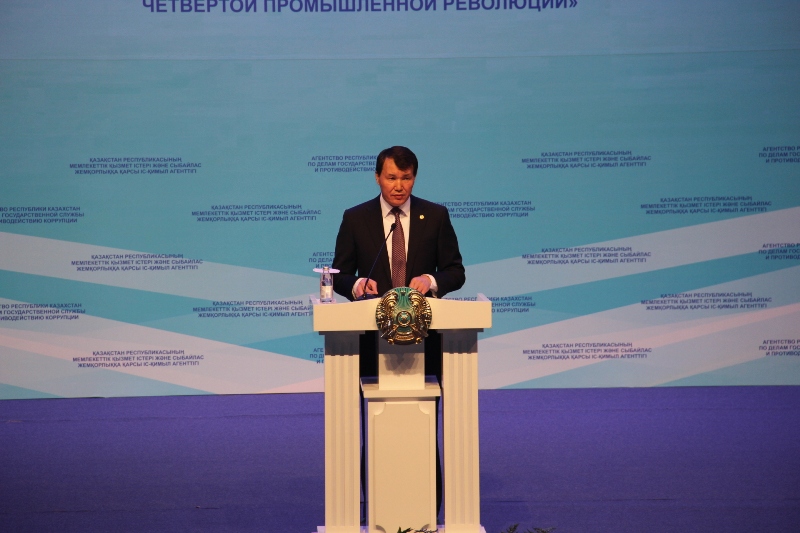ASTANA – The Kazakh Civil Service Affairs and Anti-Corruption Agency registered 1,835 corruption-related crimes in 2017 and prosecuted 320 individuals, according to agency chair Alik Shpekbayev. The number of cases is 18 percent less than 2016.
The measures returned nearly 14 billion tenge (US$43.4 million) to the national budget last year.
Shpekbayev discussed the outcomes of the agency’s work in 2017 and set priorities in developing civil service and effectively implementing anti-corruption policies during a Jan. 31 agency board meeting. Introducing a merit-based model in civil service increased its attractiveness, ensured its stability and improved the quality of civil servants. The model launched in 2016 prioritises meritocracy; a person beginning a civil service career must start from the lowest position, with promotions based on his or her merits.
Competition for a higher-level position is conducted solely among current civil servants. The model decreased non-competitive recruitment 18 times, said Shpekbayev, though the March report published by the Organisation for Economic Co-operation and Development (OECD) emphasised the issue remains acute in Kazakhstan.
He added 1.3 percent of newcomers decide to leave the job. Kazakhstan is trying to align with other OECD countries, where the indicator ranges from 2.7 percent in the U.S. to 24.5 percent in Estonia.
Civil servants, however, still need to change their way of thinking, said Shpekbayev.
“We seek to have a large-scale and comprehensive transformation of consciousness among civil servants that should stand at the vanguard of changes. Artificial intelligence already can write template e-mails, quickly process data and offer solutions to different problems. This means it can do everything that a Kazakh civil servant is required to do. Therefore, [it is important to] develop the so-called flexible skills – leadership, communication skills, empathy, critical thinking – the skills that are not available on a machine,” he added.
A civil servant of the digital era is also distinguished by IT literacy and language proficiency, he said.
“Following te adoption of the Digital Kazakhstan programme, we are working on the implementation of a digital agency project. It envisions incorporation of advanced technologies, including expanding the e-kyzmet information system (integrated system for civil service staff management) and stage-by-stage transition to electronic criminal case processing,” he added.
Incorporating digital solutions should start with civil servants successfully mastering and actively using electronic services, as fundamental transformation means first “changes in daily habits,” said Shpekbayev. These include e-government, registering a digital signature to sign documents in electronic format and obtaining services solely in electronic format.
The idea lies at the centre of the national project aimed at improving the nation’s civil service by moving away from the currently-prevailing bureaucracy to more contemporary and efficient approaches. The project is part of the broader Rukhani Janghyru (Modernisation of Kazakhstan’s Identity) programme.
The agency will continue its active cooperation with the public sector and organisations, Shpekbayev added.
In 2017, the agency compiled a corruption risk analysis with the Atameken National Chamber of Entrepreneurs, examining 16 areas of primary significance for business development.
Kazakhstan’s ruling Nur Otan Party assisted the agency in identifying and examining corruption risks in education, healthcare, social protection and housing. Similar work was completed with labour unions in the oil, gas, mining and metallurgy industries, primary sectors of the nation’s economy.
The agency reviewed more than 3,000 recommendations, mostly dealing with the imperfection of the existing procedures, discretionary powers and the presence of a conflict of interest.
Maintaining a favourable investment climate depends on the success of anti-corruption efforts, said Shpekbayev. He urged the agency’s regional offices to prevent state bodies from intervening in foreign companies’ activities.
“Each and every one of us should be convinced that a corrupt official has no moral right to fight corruption and, moreover, teach others. Each corruption case should be made public with the proper legal consequences,” he added.


